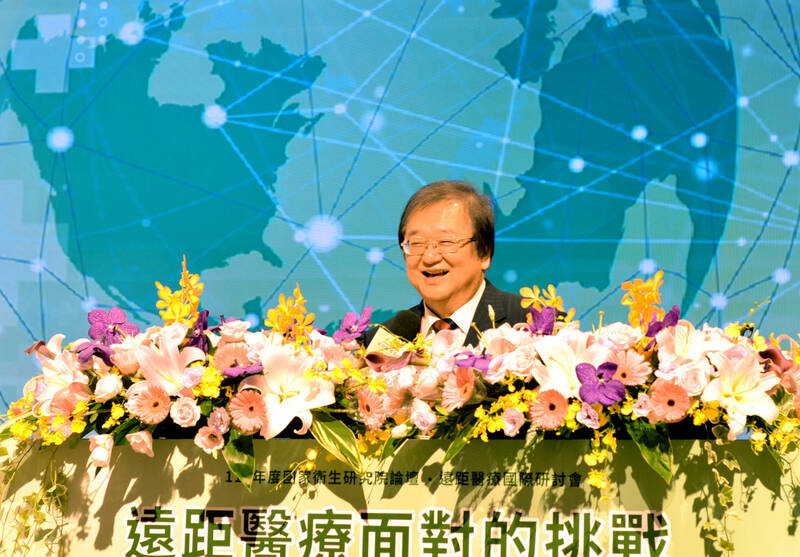Taiwan should learn from other countries to advance telehealth services in the post-COVID-19 pandemic era, Minister of Health and Welfare Chiu Tai-yuan (邱泰源) said yesterday.
Chiu made the remark at a Taipei conference titled the “Current Challenges and Opportunities in Telehealth,” held by the National Health Research Institutes (NHRI) Forum, Taipei Medical University and National Yang Ming Chiao Tung University.
In his opening speech, Chiu discussed the concept of “social prescribing,” encouraging healthcare providers view patients through a professional medical lens and refer them to a range of person-centered non-clinical care services to support their health and well-being.

Photo: CNA
Since becoming the director of a public health center in 1988, Chiu said he began overseeing the operations of telehealth and hospice care.
His experience working with people in hospice care showed him the importance of person-centered care and that patients are connected to the community, he said.
Person-centered care services and telemedicine have played important roles during the COVID-19 pandemic around the world, and in the post-pandemic era, many countries are pushing to advance telehealth services, Chiu said.
While different countries have different opinions on quality, regulations, ethics and privacy regarding telehealth services, it has become a common challenge for many healthcare systems around the world, he said.
Taiwan should continue to learn from and communicate with other countries to advances its telehealth services, he said.
In the post-COVID-19 era, telemedicine still faces challenges, including healthcare quality monitoring, patient privacy safety, regulations and regulatory reviews, but after some experience, the scope of telemedicine was expanded in July, NHRI Forum vice chairman Wayne Sheu (許惠恒) said.
Taipei Medical University Board of Trustees chairman Chen Ray-jade (陳瑞杰) said telemedicine did not disappear after COVID-19 ended, but transformed into telehealth, and is shifting its focus from acute care to chronic care services.
The focus of telehealth is on individuals or families, so if there is a comprehensive telehealth system, people can still receive healthcare at home when a disaster or pandemic occurs, which is an embodiment of a “resilient health system,” Chen said.
However, telemedicine in the post-COVID-19 era faces four main challenges: regulations, payment systems, technology and personal information security, he said.
The conference was held for people from the private and government sectors, academics and healthcare providers to discuss solutions, he said.
Telehealth can also be extended beyond medical treatment, to health education, holistic healthcare and weight management, or even allow people to participate in clinical trials at home, he added.
Additional reporting by CNA

US climber Alex Honnold is to attempt to scale Taipei 101 without a rope and harness in a live Netflix special on Jan. 24, the streaming platform announced on Wednesday. Accounting for the time difference, the two-hour broadcast of Honnold’s climb, called Skyscraper Live, is to air on Jan. 23 in the US, Netflix said in a statement. Honnold, 40, was the first person ever to free solo climb the 900m El Capitan rock formation in Yosemite National Park — a feat that was recorded and later made into the 2018 documentary film Free Solo. Netflix previewed Skyscraper Live in October, after videos

NUMBERS IMBALANCE: More than 4 million Taiwanese have visited China this year, while only about half a million Chinese have visited here Beijing has yet to respond to Taiwan’s requests for negotiation over matters related to the recovery of cross-strait tourism, the Tourism Administration said yesterday. Taiwan’s tourism authority issued the statement after Chinese-language daily the China Times reported yesterday that the government’s policy of banning group tours to China does not stop Taiwanese from visiting the country. As of October, more than 4.2 million had traveled to China this year, exceeding last year. Beijing estimated the number of Taiwanese tourists in China could reach 4.5 million this year. By contrast, only 500,000 Chinese tourists are expected in Taiwan, the report said. The report

Temperatures are forecast to drop steadily as a continental cold air mass moves across Taiwan, with some areas also likely to see heavy rainfall, the Central Weather Administration (CWA) said. From today through early tomorrow, a cold air mass would keep temperatures low across central and northern Taiwan, and the eastern half of Taiwan proper, with isolated brief showers forecast along Keelung’s north coast, Taipei and New Taipei City’s mountainous areas and eastern Taiwan, it said. Lows of 11°C to 15°C are forecast in central and northern Taiwan, Yilan County, and the outlying Kinmen and Lienchiang (Matsu) counties, and 14°C to 17°C

STEERING FAILURE: The first boat of its class is experiencing teething issues as it readies for acceptance by the navy, according to a recent story about rudder failure The Hai Kun (海鯤), the nation’s first locally built submarine, allegedly suffered a total failure of stern hydraulic systems during the second round of sea acceptance trials on June 26, and sailors were forced to manually operate the X-rudder to turn the submarine and return to port, news Web site Mirror Daily reported yesterday. The report said that tugboats following the Hai Kun assisted the submarine in avoiding collisions with other ships due to the X-rudder malfunctioning. At the time of the report, the submarine had completed its trials and was scheduled to begin diving and surfacing tests in shallow areas. The X-rudder,